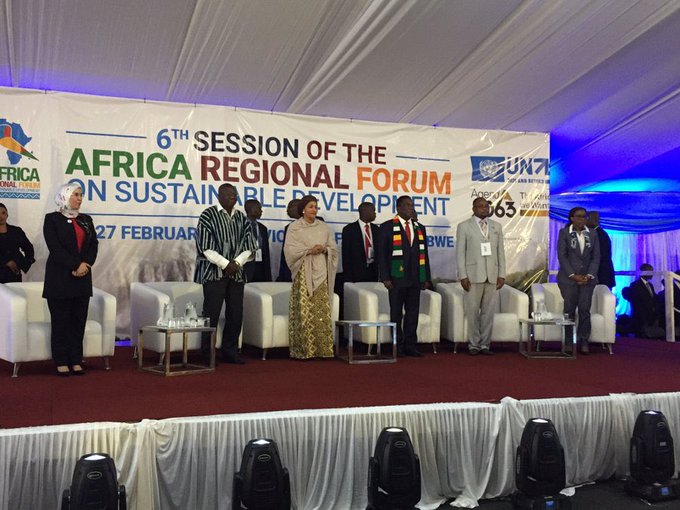The Africa Regional Mechanism of the Major Groups and other Stakeholders (ARMMGOS) – formerly known as Africa Regional Civil Society Engagement Mechanism (ARCSEM) – under the auspices of the United Nations Economic Commission of Africa (UNECA) was officially launched on the 24th February 2020 at the sixth session of the African Regional Forum on Sustainable Development (ARFSD) held under the theme “2020-2030: A Decade to Deliver a Transformed and Prosperous Africa through the 2030 Agenda and Agenda 2063” from the 24th – 27th February 2020 in Victoria Falls, Zimbabwe.
The Africa Regional Mechanism of the Major Groups and other Stakeholders (ARMMGOS) is an independent mechanism that facilitates the participation of Major Groups and other Stakeholders (MGoS), and Civil Society Organizations’ based in Africa in regional and global United Nations Sustainable Development processes.
Through its structures, the Africa Regional Mechanism of the Major Groups and other Stakeholders” will reach out to civil society organizations in all 54 African countries, sub-regional and thematic networks, major groups, other stakeholder groupings, and key regional constituencies to share information with them on regional and global policy debates and processes on sustainable development, promote civil society consultations and dialogue, support national and regional advocacy and facilitate the participation of a diverse range of Civil Society Organizations (CSOs) and marginalized groups in regional and global level dialogues and processes on Sustainable Development under the United Nations.
The objectives of the mechanism are as follows:
I. To coordinate and facilitate the coherent engagement of Major Groups, Other Stakeholders; and Civil Society Organizations in Africa on Sustainable Development and Post 2015 Development Framework Processes at Regional and Global Level;
II. To coordinate and facilitate access to and exchange of information, best practices and experiences on sustainable development amongst Civil Society Organizations, Major Groups and Other Stakeholders in Africa;
III. To contribute to defining and promoting the African narrative on Sustainable Development at national, regional, and global levels.
IV. To coordinate the contribution of African civil society organizations, Major Groups and Other Stakeholders (both technical and resources) towards the implementation, follow-up, and monitoring of the 2030 Agenda, Agenda 2063, Addis Ababa Action Agenda on Financing for Development, the Paris Agreement on Climate Change, Sendai Framework for Disaster Risk Reduction, and other sustainable development-related processes.
V. To coordinate and facilitate the development of common positions, statements, and inputs on sustainable development by Major Groups, Other Stakeholders, and Civil Society Organizations in Africa;
VI. To liaise with the United Nations including UNECA, UN Funds, Programs and Agencies on the engagement of African Civil Society, Major Groups and Other Stakeholders in Sustainable Development Processes at Regional and Global Level;
VII. To convene and coordinate a Major Groups and other Stakeholders forum as a preparatory event before each session of the Africa Regional Forum on Sustainable Development;
VIII. To represent and amplify the voice of Major Groups, Other Stakeholders, and Civil Society Organizations in Africa at the High-Level Political Forum (HLPF), and MGoS Coordination Mechanism Steering Group;
IX. To contribute towards transparency and accountability in the implementation of sustainable development in Africa; and
X. To facilitate and coordinate the invitations and accreditation of Major Groups and other Stakeholders, and Civil Society Organizations in Africa in regional United Nations meetings on Sustainable Development. The mechanism which is being managed by a committee constituted with representatives of the 17 constituent groups – older persons, people with disability, academia, volunteers, women, children and youth, NGOs, farmers, indigenous peoples, workers and trade unions, scientific and technological community, local authorities – and national platforms working on sustainable development and representing the African Regional Blocs (East Africa, West Africa, Central Africa, North Africa, and Southern Africa) is currently led by three co-chairs – Kofi Kankam (Major Groups, NGO representative), Roseline Kihumba (Stakeholders, the elderly representatives), and Martin Tsounkeu (National Platforms, West Africa) who are mandated to spearhead the mechanism and its activities to ensure it achieves its set objectives.






